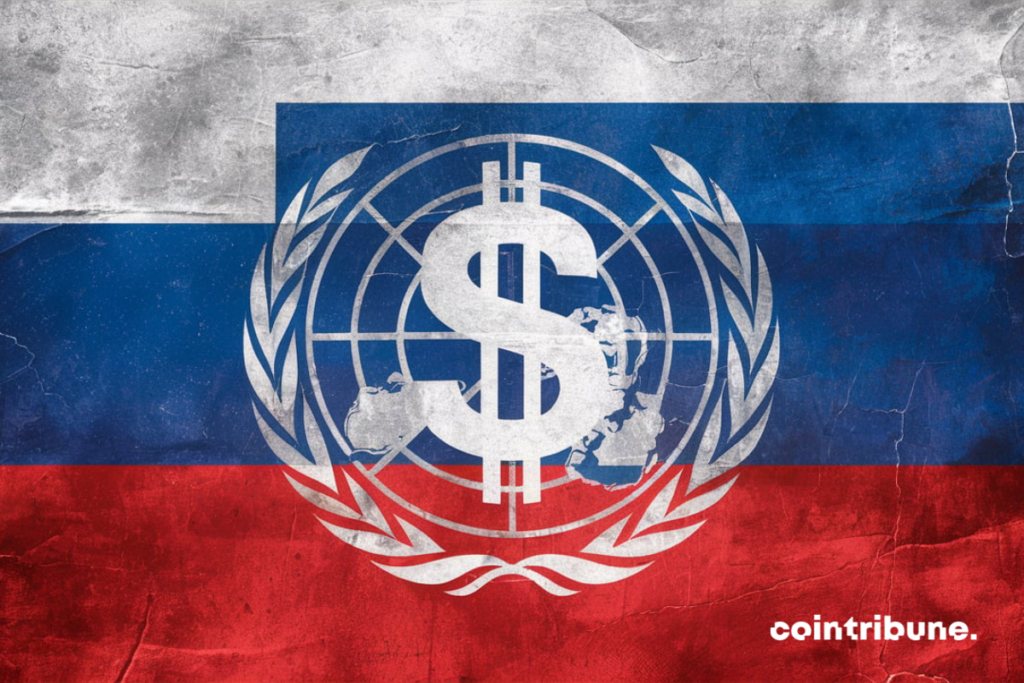Russia's Foreign Minister Lavrov presents five points of action at the UN to stop the spiral into World War 3 pic.twitter.com/1gdqQ1KCSR
— COMBATE |🇵🇷 (@upholdreality) July 17, 2024
A
A
Russia pleads in New York for the end of the dollar monopoly
Sat 20 Jul 2024 ▪
6
min read ▪ by
Getting informed
▪
Payment
The issue of the international monetary system is at the heart of the geopolitical Gordian knot. Bitcoin appears as an obvious choice, even for Trump.

Lavrov sets conditions in New York
Russia took on the rotating presidency of the United Nations Security Council on July 9. The Russian Foreign Minister took the opportunity to visit New York…
Sergei Lavrov delivered a speech outlining the problems that need to be addressed to ease international relations. Russia primarily calls for “concrete steps regarding the removal of Western threats weighing on the Russian Federation.” In other words, NATO’s expansion must stop.
The second point was very interesting. The diplomat stated that “restoring the balance of regional and international powers must be accompanied by efforts to eliminate the injustices at the heart of the global economy. In a multipolar world, by definition, there can be no monetary monopoly […]”.
“Saudi Arabia is considering ways to reduce its dependence on the dollar in the event of the West seizing Russia’s foreign exchange reserves. The dedollarization process is underway, it cannot be stopped”, he later told the press.
Mr. Lavrov warned that the finance ministers and central bank governors of the BRICS countries are working on creating alternative payment systems. “For instance, President [of Brazil] Lula da Silva actively promoted the idea of creating alternative payment platforms at last year’s BRICS summit. Some recommendations are expected to be presented at the Kazan summit in October”, he added.
For Mr. Lavrov, “the overwhelming majority of nations” want an evolution of voting rights within the Bretton Woods institutions (IMF and World Bank). In light of the US veto power, the envoy stated that the BRICS and the Shanghai Cooperation Organization (SCO) now represent the “Gold standard of multilateral relations between great powers”.
The dollar, keystone of tensions
The term “gold standard” is not used lightly. The Russian and Chinese central banks have been accumulating large quantities of gold since the second Iraq war. This trend intensified following the 2008 crisis when the Fed began monetizing public and private debts (QE).
This easy solution does not appeal to exporting nations like Russia and China, which place their reserves in the dollar (specifically in US debt).
The dollar is the “pivot” currency. That is to say, all other currencies float relative to it. For instance, Korean won is not exchanged directly for Argentine peso. One must go through the dollar. A single pivot currency allows minimal conversion fees.
The greenback has been at the center of the international monetary system since the end of World War II. The end of the gold standard in 1971 did not change this, thanks to the petrodollar system. Essentially, in this system, nations place their trade surpluses in US debt. The figure is around 7 trillion dollars, which is 58% of all global foreign exchange reserves.
The “exorbitant privilege” that stems from this allows the United States to have a chronically deficit trade balance without the dollar falling. In short, Americans pay much less for their imports than they normally would.
Hence the ambition of the BRICS to get rid of the American currency. The share of the dollar in the reserves of countries like Russia, China, and Saudi Arabia has been decreasing for several years now.
Bitcoin, Bretton Woods 2.0
If Donald Trump genuinely wants to avoid a third world war, he cannot overlook the monetary question.
In fact, perhaps this is why he openly calls on Jerome Powell not to lower rates before the presidential election? This scenario makes complete sense in light of this 2023 exchange between Vice President James Vance and Fed Chairman Jerome Powell:
For non-English speakers, Senator Vance suggests that having the international reserve currency might not be a gift. He believes it would be better to reduce the trade deficit to rebuild the American industrial base, even if it means a weaker dollar. However, fewer imports would mechanically lead to inflation, hence the need to maintain high rates.
Faced with new tariffs, China will continue to shun the dollar. A new international reserve currency satisfying both powers will then need to be found. This is where bitcoin comes into play…
As Travis Kling stated on CNN, bitcoin is a stateless, immutable, and decentralized digital store of value. It is a strong currency and an extremely competitive network for large international payments. Two-in-one.
Bitcoin is a neutral system that would allow all nations to trade and save on equal footing. Senator Cynthia Lummis claims that Mr. Trump “sees bitcoin’s potential as a savings technology.”
The former US president even stated this week: “China is interested [in bitcoin]. It’s here to stay”. Not to mention that China’s biggest bank (ICBC) recently declared that bitcoin is superior to gold.
Will he announce the creation of an American bitcoin reserve fund at the Bitcoin conference in Nashville next weekend?
Don’t miss this article: Bitcoin or CBDC? Russia wants both.
Maximize your Cointribune experience with our "Read to Earn" program! For every article you read, earn points and access exclusive rewards. Sign up now and start earning benefits.
A
A
Bitcoin, geopolitical, economic and energy journalist.
DISCLAIMER
The views, thoughts, and opinions expressed in this article belong solely to the author, and should not be taken as investment advice. Do your own research before taking any investment decisions.